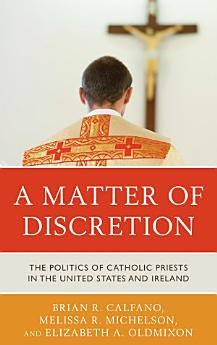A Matter of Discretion: The Politics of Catholic Priests in the United States and Ireland
Apr 2017 · Bloomsbury Publishing PLC
Ebook
222
Pages
reportRatings and reviews aren’t verified Learn More
About this ebook
Clergy are pillars of local religious communities, and Roman Catholic priests are perhaps the quintessential examples of pastors functioning as political elites. The political science literature demonstrates that priests (indeed, clergy more generally) are well-positioned to influence the faithful, even if this influence is somewhat inconsistent. At their core, priests are opinion leaders and representatives of their church to both the faithful and their local communities.
But exactly how Catholic priests determine the political acts and attitudes associated with their elite role remains a puzzle. We suggest it is the product of an interactive institutional, social, and psychological milieu, the complexity of which has not been fully assessed in the extant literature. Though some might prefer to think of priests as profiles in courage operating above the political fray, the institutional and personal realities of priest life often forces them to deal with the political realm. In doing so, priests are variably responsive to different principals, or reference groups, that represent specific dimensions of their professional context. Drawing on a series of randomized experiments on samples of Roman Catholic priests in the US and Ireland, we find that priests cognitively draw on varying professional and personal cues in responding to their employer’s institutional preferences. Furthermore, how priests represent their church's political preferences to parishioners appears to be a matter of individual-level discretion.
But exactly how Catholic priests determine the political acts and attitudes associated with their elite role remains a puzzle. We suggest it is the product of an interactive institutional, social, and psychological milieu, the complexity of which has not been fully assessed in the extant literature. Though some might prefer to think of priests as profiles in courage operating above the political fray, the institutional and personal realities of priest life often forces them to deal with the political realm. In doing so, priests are variably responsive to different principals, or reference groups, that represent specific dimensions of their professional context. Drawing on a series of randomized experiments on samples of Roman Catholic priests in the US and Ireland, we find that priests cognitively draw on varying professional and personal cues in responding to their employer’s institutional preferences. Furthermore, how priests represent their church's political preferences to parishioners appears to be a matter of individual-level discretion.
About the author
Brian R. Calfano (Ph.D., University of North Texas) is assistant professor of political science and journalism at the University of Cincinnati and is the academic advisor for the EmbRACELA study conducted by the City of Los Angeles Human Relations Commission. Calfano is the author of God Talk: Experimenting with the Religious Cause of Public Opinion (with Paul Djupe). His work has appeared in Political Research Quarterly, Political Behavior, Political Communication, PS: Political Science and Politics, and State Politics and Policy Quarterly, among other outlets.
Melissa R. Michelson (Ph.D., Yale University) is professor of political science at Menlo College. She is author of Listen, We Need to Talk: How to Change Attitudes about LGBT Rights (with Brian F. Harrison), Living the Dream: New Immigration Policies and the Lives of Undocumented Latino Youth (with Maria Chávez and Jessica L. Lavariega Monforti), and Mobilizing Inclusion: Transforming the Electorate through Get-Out-the-Vote Campaigns (with Lisa García Bedolla). Michelson's work has appeared in American Political Science Review, Journal of Politics, and many other outlets.
Elizabeth A. Oldmixon (Ph.D., University of Florida) is associate professor of Political Science at the University of North Texas, and a fellow at the Schusterman Center for Israel Studies Summer Institute, Brandeis University. Oldmixon's research focuses on clergy politics and religion and legislative policy-making. She is author of Uncompromising Positions: God, Sex, and the U.S. House of Representatives, and her work has appeared in Politics and Religion, Legislative Studies Quarterly, Political Research Quarterly, and Journal of Church and State. She is editor-in-chief of Politics and Religion.
Melissa R. Michelson (Ph.D., Yale University) is professor of political science at Menlo College. She is author of Listen, We Need to Talk: How to Change Attitudes about LGBT Rights (with Brian F. Harrison), Living the Dream: New Immigration Policies and the Lives of Undocumented Latino Youth (with Maria Chávez and Jessica L. Lavariega Monforti), and Mobilizing Inclusion: Transforming the Electorate through Get-Out-the-Vote Campaigns (with Lisa García Bedolla). Michelson's work has appeared in American Political Science Review, Journal of Politics, and many other outlets.
Elizabeth A. Oldmixon (Ph.D., University of Florida) is associate professor of Political Science at the University of North Texas, and a fellow at the Schusterman Center for Israel Studies Summer Institute, Brandeis University. Oldmixon's research focuses on clergy politics and religion and legislative policy-making. She is author of Uncompromising Positions: God, Sex, and the U.S. House of Representatives, and her work has appeared in Politics and Religion, Legislative Studies Quarterly, Political Research Quarterly, and Journal of Church and State. She is editor-in-chief of Politics and Religion.
Rate this ebook
Tell us what you think.
Reading information
Smartphones and tablets
Install the Google Play Books app for Android and iPad/iPhone. It syncs automatically with your account and allows you to read online or offline wherever you are.
Laptops and computers
You can listen to audiobooks purchased on Google Play using your computer's web browser.
eReaders and other devices
To read on e-ink devices like Kobo eReaders, you'll need to download a file and transfer it to your device. Follow the detailed Help Center instructions to transfer the files to supported eReaders.






